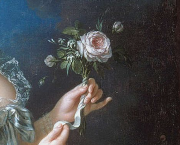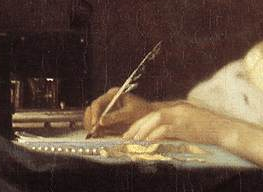31 août 2015, Irsee : Women Artists – New Perspectives on the Research Area of the Pre-Modern Era
In 1687 François Fénelon stated in his treatise on the education of girls (“De l’éducation des filles”) : “Women in general have feebler minds than men and are more curious than men. Would it not also be purposeful to introduce them to studies which could occupy their minds completely. (…) Mechanical skills are for the most part unsuitable for them.”
Gender research in the field of the Late Middle Ages and the Early Modern Era has been conducted extensively for many years. Theory formation of the research approach has advanced greatly ; in contrast, concern with concrete examples of women artists, female studio employees or female heads of studios has proven to be much less productive. It is true that individual personalities such as Artemisia Gentileschi, Sofonisba Anguissola or Properzia de’ Rossi – the only woman to whom Vasari dedicated a biography of her own – have received great attention ; but the ‘search’ for hitherto unknown women artists has surely not been concluded. Even more than forty years ago, Linda Nochlins asked : “Why Have There Been No Great Women Artists ?” Nochlin revealed the cultural practices which degraded women artists to ‘special cases’ and rendered them ‘invisible’. Up to the present, especially anonymous women artist personalities have remained without clear contours in the field of the social history of the artist. To take on the highly interesting topic of the pre-modern woman artist, we must expand the spectrum. This conference will include for the first time the term ‘woman artist’ in all of the aspects of artistic creativity : Along with (princely) dilettantes or studio employees there were, for example, numerous widows who single-handedly conducted the workshop/studio or the printing business after the death of the artist, sometimes for decades. Furthermore, to name an additional example, the term ‘muse’ must be redefined as it is still one-sidedly sexualised, and the woman concerned is degraded to exclusively inspiring the senses of the male artist. A profound alteration became manifest only late in the 20th century. To name only one example, it took a long time before the concept artist Christo named his wife as an artist of equal rank and Jean-Claude was no longer degraded simply as the muse. Many so-called muses have presumably taken an active part in a creative process as a kind of equal partner and as artist ‘at his side’, giving the male artist’s work important incentives. Moreover, it must be assumed that, as early as the Late Middle Ages, women in court circles, for example, were often more literate than men and were more greatly involved as educated advisors in artistic processes than has previously been thought.
In addition to the important approaches in the form of analyses of individual women artists, the conference wishes to portray both a broad spectrum concerning the term ‘woman artist’ as well as to open up perspectives into the modern. The emphasis here will be placed on the art of the Early Modern Era.
Papers on the methods of gender studies are welcome as are (new) definitions of terms as well as papers on art history and scholarship history, including the role of women artists in the history of exhibitions, the development of an historical art canon or its (presumed) positioning within the genre hierarchy.
Abstracts for hitherto unpublished articles (max. 2,000 characters, including spaces) in German or English can be sent together with a brief CV and, if applicable, a selection of related publications to Dr. Birgit Ulrike Münch M.A., email : kfi chez uni-trier.de by 31 August 2015.
Date of the conference : 18-20 march 2016
The Irsee Art History Forum will be conducted in cooperation with the Schwaben Academy Irsee (Dr. Markwart Herzog, Dr. Sylvia Heudecker) and artifex (Dr. Birgit Ulrike Münch, Dr. Andreas Tacke, Professor, both of the University of Trier).
Founded in 2012, the Irsee Art History Forum organizes annual Spring Academies. These conferences are devoted to the research area “the artist and society”. The Irsee Art History Forum offers an intra- and interdisciplinary research framework. Its goal is to combine research approaches to serious art history in all disciplines, methods and questions of (historical) cultural scholarship.
Calls for papers on specific topics are tendered annually, with a high percentage of young academics being drafted, that is, academics in the doctoral phase as well as the post-doctoral phase. Moreover, the forum aims to develop academic topics which are currently being discussed in society, so that innovative scholarly approaches are conveyed to the public.
Along with holding the annual Spring Academies, we have set a goal of always publishing the conference results. The results of a Spring Academy are to be published by the Michael Imhof Publishing Company (Petersberg) and presented in the respective following Spring Academy.




